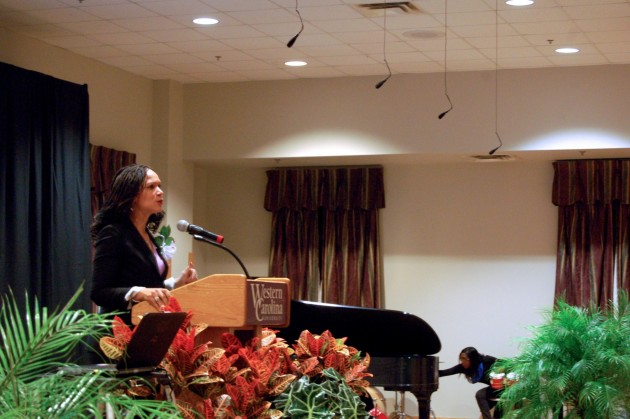
The MLK Jr. Commemoration is a major event at Western Carolina University that celebrates Dr. Martin Luther King Jr.’s life and his works. One of the chief events is the MLK Jr. Keynote Speaker.
According to Takeshia Brown, associate director for programs in the department of Intercultural Affairs and who also planned and coordinated the events for the 2014 MLK, Jr. Commemoration, they bring in speakers who “really are in-tune with the dream,” are “leaders in their field,” and who “can articulate that leadership and the impact of Dr. King’s dream.” They bring in speakers who hold a lot of knowledge in their purpose of educating the students at WCU.
“It’s usually someone of some great notoriety to come in and share their expertise and knowledge with us,” said Brown.
The keynote speaker that imparted her insight to the WCU community this year was Dr. Melissa V. Harris-Perry. As stated on the WCU’s MLK Jr. Keynote Speaker page for the 2014 MLK Jr. Commemoration on WCU’s website, Harris-Perry is the host of MSNBC’s show “Melissa Harris-Perry,” and is “professor of political science at Tulane University, where she is founding director of the Anna Julia Cooper Project on Gender, Race, and Politics in the South.” She is also “author of the book Sister Citizen: Shame, Stereotypes, and Black Women in America” and the “award winning text Barbershops, Bibles, and BET: Everyday Talk and Black Political Thought” and is “a columnist for The Nation magazine where she also writes a monthly column also titled Sister Citizen.”
Harris-Perry spoke at WCU on January 22. The turnout for the event was quite tremendous. The line for the event was formed outside of the doors to the A.K. Hinds University Center Grand Room and stretched all the way to the doors that open to the CatTran stop behind the University Center and wound around back to the doors of the Grand Room.
At the opening of the event, Brown spoke and thanked the 2014 Martin Luther King Jr. Planning Committee. After Brown spoke, members of Truthwriters Sarah Sheehan and Joshua Pugh shared their pieces that honored Dr. Martin Luther King. Following that, Director of Intercultural Affairs, James Felton, recognized WCU’s Chancellor David O. Belcher and gave way to Belcher’s welcome, in which he articulated the significance of the MLK, Jr. Commemoration, his unwavering support of the commemoration and how he was honored to have Harris-Perry at WCU. After Belcher’s welcome, the Inspirational Choir at WCU sang “Lift Ev’ry Voice and Sing,” to which the audience stood up and sang with the choir and “The Best is Yet to Come.” Belcher then introduced Harris-Perry.
Harris-Perry started off by showing the audience a picture of the Martin Luther King Jr. Monument in Washington, D.C. and asked the audience what was wrong with it. She revealed that what she thought was wrong with the monument is the fact that Dr. King is “standing alone, emerging from a rock.” She said that “King did not emerge from a rock” and that he “comes out of a people, a movement, a set of institutions.”
Throughout Harris-Perry’s presentation, she talked about Dr. King and who he really was. In her address of the real Dr. King, she informed the audience of things such as, how King was a “servant leader” for his movement and how he “took blame and shared credit” for it, the influence he had on President Lyndon B. Johnson, as well as how he was a “combination of other models.”
Harris-Perry also illuminated how Bayard Rustin was the person who taught King non-violence and took him “through the steps of what it is to be a civil rights activist.”
In her presentation, Harris-Perry also touched on contemporary issues. She divulged that there is still inequality present in the U.S. Harris-Perry expanded on this by showing graphs that revealed facts such as how the poverty rates are higher for African Americans, Hispanics and Latinos, and the widening racial wealth gap. She also discussed the variables and outliers that are applicable to the gap and impact the poverty rates.
The audience was quite enamored by her presentation.
Senior Alyssa Ammon said, “I thought she was really great, and I feel like she really challenged us to think.”
When asked what she got out of Harris-Perry’s speech, sophomore Asha Evans said, “Equality is a world-wide term. It has different meanings for whoever and that we shouldn’t just associate Martin Luther King as being the one sole person who did it because he was basically a collective effort like she said.”
“I thought it was pretty cool. She touched on a lot of aspects, and a lot of concerns that I have about today’s society,” said Junior Jermaine Brawley.
Harris-Perry disclosed many significant details about who Dr. Martin Luther King, Jr. was and the inequality that is still present in America’s society. Harris-Perry also enriched the knowledge of her audience and caused them to think about what she divulged to them.






